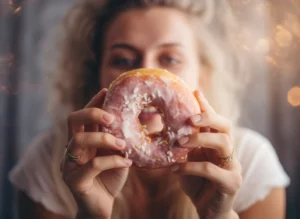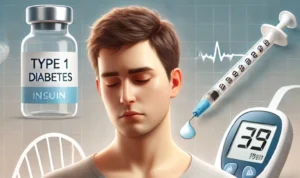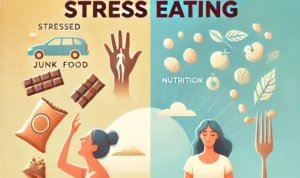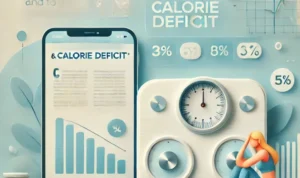Table of Contents
ToggleHave you ever experienced anxiety and panic symptoms immediately after having a meal, feeling guilty, weird, and feeling under immense stress? You may experience a feeling like something bad is coming your way or even you are dying. These all are symptoms of anxiety and anxiety itself doesn’t have a warning sign. It just starts within seconds even if you are calm and steady.
The moment you get triggered by even the slightest thing, the anxiety kicks in. Food is an unavoidable trigger that can make you feel unwell for quite a few hours.
If a person has been living with anxiety and panic attacks, he might be able to know what triggers him the most. What anxiety feels like is a heavy burden on your heart, struggling to breathe, sweaty palms and face, shakiness, dizziness, light headedness, and difficulty breathing.
These symptoms appear after having food is known as eating anxiety. It can also be linked with some type of eating disorder or can be due to body mechanism that reacts in a certain way to a specific food.
It is common for people suffering from anxiety to report being anxious after having a meal but this needs to be managed by healthy diet.
A healthy diet is comprised of all food groups which will nourish you in best possible way by providing all the essential nutrients. Despite eating healthy, you may end up with anxious feeling. This can be due to multiple reasons like:
Reasons of ANXIETY AFTER EATING
1. GERD (gastrointestinal reflux disease)
This is the back flow of the acidic contents of stomach comprising of the chewed food and he acid that mixes with food in stomach. When the acidic contents flow back due to inefficiency of the stomach valve, which becomes weak and lets the contents flow back, it causes acidity, chest pain, shortness of breath which triggers the anxiety.
If someone is already facing anxiety, he/she will perceive it as trigger and his anxiety will kick in. Anxiety and GERD are interlinked to each other, sometimes anxiety leads to GERD and the other time GERD causes anxiety. So to avoid this, you need to eat less acidic foods and soothe your stomach and GIT tract for a better quality of life.
2. Past trauma
It plays a vital role in determining the major cause behind food causing anxiety. You may have a bad or stressful experience related to a particular food. It can be food stuck in your throat, the food you had while suffering from other diseases, food that caused diarrhea vomiting, or can be anything.
Any past trauma involving the slightest evidence can trigger your anxiety. The thought of eating that food can cause you stress symptoms.
3. Eating disorders
If you are suffering from eating disorders like bulimia nervosa or anorexia nervosa, then you may face anxiety after having a meal. In eating disorders, a person misperceives the amount of food they take.
Taking a normal meal serving at a time is perceived as too much food. It triggers their brain and the brain releases fight and-flight hormones that cause the body to feel at unrest. They seem to panic after having a meal and they have a poor image of them.
They think that now that they have taken in a huge amount of food, they will try to eliminate it through self-induced vomiting or purging. All these symptoms are related to eating disorders, which require a professional counseling session in which they are assured that they are not eating too much, rather they are eating the amount of food that is needed for normal growth and functioning of body.
Furthermore, certain nutritional strategies can help like, replacing big meals with some meal replacement shakes or something light also helps because you have a perception that shakes and snacks do not burden your body.
4. Eating too much sodium
Eating high sodium foods can lead to activation of the nervous system in which it sends signals to body to activate fight or flight response.
In this situation the digestion stops, heart rate increases, pulse goes high and person senses everything as danger and remains alert. This response can be avoided by limiting high-sodium foods like added salt, canned and processed foods.
5. Conscious eating
Some people are prone to eating their pleasure foods but feel bad afterwards. When they see food, they cannot resist, and consume sugary and fried foods but deep down they know that these foods are unhealthy and will lead to weight gain.
The guilt inside you will cause anxiety symptoms and will make you feel bad about yourself. You will face low self-confidence and self-esteem.
You make bad perceptions about yourself, and you underestimate yourself that you will never be able to eat healthy. These symptoms can be managed by mental health counseling and nutritional counseling.
6. Food allergies
Food allergies and intolerance play major roles in mental health. For example, gluten allergy or wheat allergy directly affects your brain and mental health. This is due to the fact gut is known as your second brain, so eating foods that trigger your gut lining will lead to secretion of abnormal hormones from brain leading to distress.
The symptoms of food allergies may vary from physical to psychological to emotional. The person must understand that anything you eat will have a direct influence on his actions, so limiting foods that cause anxiety needs to be eliminated from diet.
7. Reactive hypoglycemia
High-glycemic foods can cause a quick spike—and subsequent drop—in blood sugar levels, leading to dizziness, shakiness, and anxiety-like symptoms. Maintaining balanced meals with complex carbs and proteins can stabilize blood sugar, reducing these sudden shifts.
8. Caffeine Consumption
Foods and drinks high in caffeine, like coffee, energy drinks, or even certain teas, stimulate the nervous system, leading to jitters, restlessness, and anxiety. Consuming caffeine on an empty stomach or alongside a meal can heighten this response.
If you’re sensitive to caffeine, try reducing or eliminating it from your diet, or replacing it with herbal alternatives that offer energy without the added anxiety.
9. Eating Late at Night
Eating too close to bedtime can trigger anxiety due to disrupted digestion and elevated energy levels that may interfere with sleep. Aim to have your last meal at least two hours before bed, allowing your body adequate time for digestion and reducing the chances of post-meal anxiety and sleep disturbances.
10. Skipping Meals and Overeating Later
Irregular eating patterns, especially skipping meals and then overeating, can cause a significant drop and rise in blood sugar, triggering anxiety symptoms. Maintaining a regular meal schedule helps regulate blood sugar levels, ensuring steady energy and reducing mood fluctuations.
Management of Eating Anxiety
Managing eating anxiety involves a mix of mental, emotional, and nutritional strategies. Here’s how you can start:
- Positive Self-Talk: Challenge negative thoughts by setting positive affirmations. Celebrating small wins, like avoiding junk food or enjoying a balanced meal, builds confidence and reduces stress.
- Mindful Eating: Practicing mindfulness while eating—such as savoring flavors, eating slowly, and portion control—creates a more satisfying experience. Research shows that mindfulness reduces stress and helps with digestion, leading to fewer instances of post-meal anxiety.
- Cognitive Behavioral Therapy (CBT): CBT and distress tolerance training can help you manage reactions to food-related anxiety. By working with a therapist, you can learn to address anxiety triggers, promoting long-term mental wellness.
- Regular Exercise: Physical activity is an excellent stress reliever and boosts endorphins, helping balance mood and reduce anxiety. Even a quick walk after a meal can improve digestion and ease tension.
- Supportive Nutrition: Working with a nutritionist to establish a balanced diet that supports both mental and physical health can make a noticeable difference. They can suggest modifications to avoid high-sodium or high-sugar foods, reducing anxiety triggers and supporting overall well-being.
Foods to Eat and Avoid to Support Mental Health
The foods you consume can play a huge role in influencing your mood. Here’s a look at what helps and what to avoid:
- Foods to Eat
- Complex Carbohydrates: Whole grains, beans, lentils, brown rice, and fruits (especially those with skin) stabilize blood sugar.
- Hydrating Fluids: Adequate hydration with water and electrolytes keeps energy stable and mood balanced.
- Protein-Rich Foods: Beans, soy products, eggs, and lean meats promote serotonin production, the “happy hormone.”
- Antioxidants and Phytochemicals: Foods like berries, citrus, and leafy greens reduce inflammation and oxidative stress, supporting mental clarity and stress reduction.
- Foods to Avoid
- Refined Carbohydrates: Foods like pastries, white bread, and sugary cereals can spike blood sugar, leading to a quick drop that triggers anxiety.
- Excessive Salt: High-sodium foods such as processed snacks can overstimulate the nervous system, increasing anxiety risk.
- Sugary and High-Fat Foods: Items like candy, soda, and fried foods can affect mood and cause energy crashes that contribute to anxiety.
CONCLUSION
So proper management of eating anxiety through nutritional counseling, behavioral therapy, correcting the eating pattern and practicing mindfulness is the key. Furthermore, avoiding the trigger foods is necessary to lead a anxiety and panic free life and even if you have eaten some food that triggers you, stop feeling guilty and move on.






